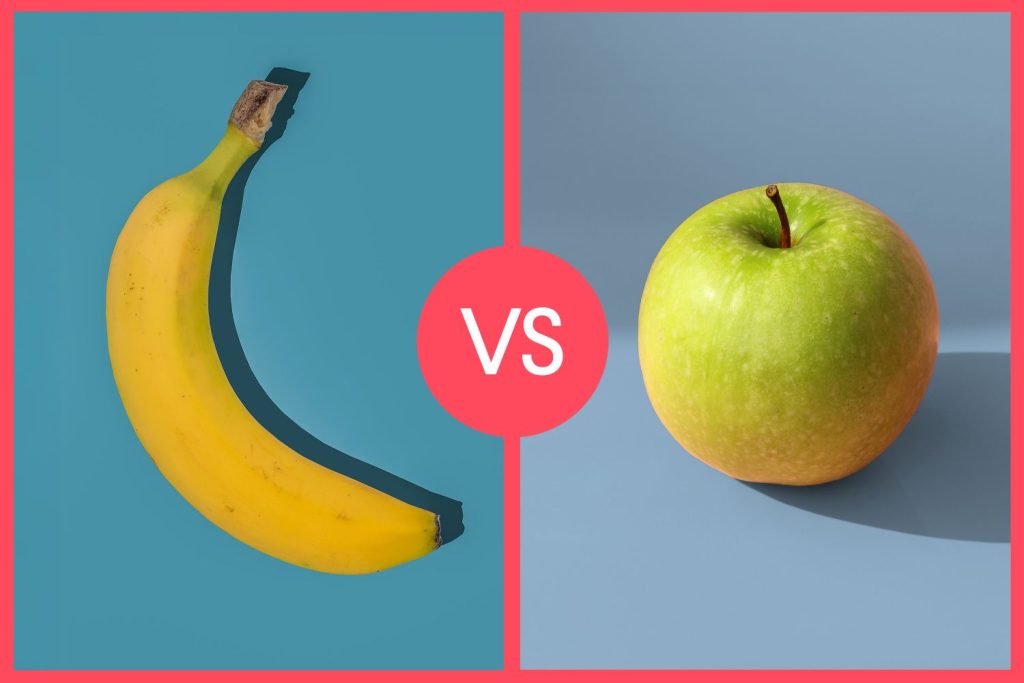:max_bytes(150000):strip_icc():format(jpeg)/apple-vs-banana-GettyImages-957700044-13c8a9daaf9342b498751f05b6129058.jpg)
Key Takeaways
- Bananas provide quick, easily digestible energy and are packed with potassium, making them ideal before or after workouts or when you need an energy boost.
- Apples offer more fiber and fewer natural sugars, which can help with longer-lasting satiety and better blood sugar regulation throughout the day.
- Both fruits are nutritious choices, and pairing them—or enjoying either with protein-rich foods like nuts or yogurt—can balance quick energy with sustained fullness.
Apples and bananas are two of the most popular fruits in the United States—so much so that there are children’s songs dedicated to them. Neatly packaged in its very own peel, bananas are convenient and portable. But you can just as easily toss an apple in your lunch bag or box. Though both are healthy fruits, which is better for you? We asked a registered dietitian to weigh in.
Are Bananas Healthy?
Rich with nutrients, bananas are indeed a healthy snack. “Bananas are known for being high in potassium, an essential mineral that helps regulate blood pressure, nerve function, and muscle contractions,” says Brannon Blount, RD, a registered dietitian in Danville, Virginia. “They also provide vitamin B6, vitamin C, and fiber.”
Here’s a closer look at some of the key nutrients found in one medium banana, per USDA data:
Calories: 105
Carbohydrates: 26.9 grams (g)
Fiber: 3.07 g
Protein: 1.29 g
Fat: 0.39 g
Potassium: 422 milligrams (mg)
Vitamin B6: 0.43 mg
Vitamin C: 10.3 mg
There’s even research on the benefits of bananas. High in antioxidants, bananas may offer cardiovascular benefits, such as warding off atherosclerosis, one review found. Other research demonstrates potential anti-cancer properties of bananas, particularly in relation to pancreatic and breast cancer.
So, when should you reach for a banana? “Bananas are a great choice when you need quick, easily digestible energy, such as before or after exercise,” Blount says. “They also tend to be easier on sensitive stomachs and offer more potassium, which can help replenish electrolytes lost through sweat.”
Ultimately, a banana is pretty much always a healthy choice, particularly when you need to replenish your energy. This fruit is rich in nutrients like fiber, potassium, and antioxidants, helping to support overall health and potentially reducing the risk of certain diseases.
Are Apples Healthy?
It’s no secret that apples are nutritious as well. The famous proverb “an apple a day keeps the doctor away” could explain why apples are the #1 fruit consumed in the United States. But why are they so good for you? “Apples are high in antioxidants, vitamin C, and fiber,” Blount explains. “Antioxidants can have anti-inflammatory and immune-supporting benefits, while fiber, particularly a soluble fiber called pectin, can help lower cholesterol and support gut health.”
Here’s an overview of the key nutrients found in one medium apple, per USDA data:
Calories: 122
Carbohydrates: 29.6 g
Fiber: 4.2 g
Protein: 0.34 g
Fat: 0.3 g
Potassium: 208 mg
Vitamin C: 9.2 mg
There’s research on this too. Rich in phytochemicals, apple consumption can improve your health, research suggests. Apples may offer protection from cardiovascular diseases, cancer, and more. Additional research has found that apples may prevent or mitigate other chronic diseases, including diabetes and obesity.
When should you grab an apple? “Apples are great for mid-afternoon snacking when you need something filling that won’t spike your energy too quickly,” Blount explains. “They’re also lower in natural sugars and on the glycemic index, which means they may help regulate blood sugar levels more effectively for some people.”
Overall, you can’t go wrong with opting to snack on an apple. They provide an array of nutrients and antioxidants, which may help stave off certain diseases.
Which Fruit Is Healthier?
Bananas and apples are both popular and nutritious fruits. Either one can help tide you over between meals, and they both provide serious nutritional benefits. But which is best? “It really depends on the person and the situation,” Blount says.
There are some cases where one may be superior to the other. “Bananas offer quick energy and more potassium, making them ideal for active lifestyles,” Blount explains. “Apples provide more fiber, and may support longer-lasting fullness and better blood sugar control.”
Blount’s expert advice? Choose whichever fruit you like best, or, better yet, pair the two together. “Combine bananas and apples with a handful of nuts or yogurt for a satisfying, nutrient-dense snack that combines quick energy with long-lasting fullness!”

